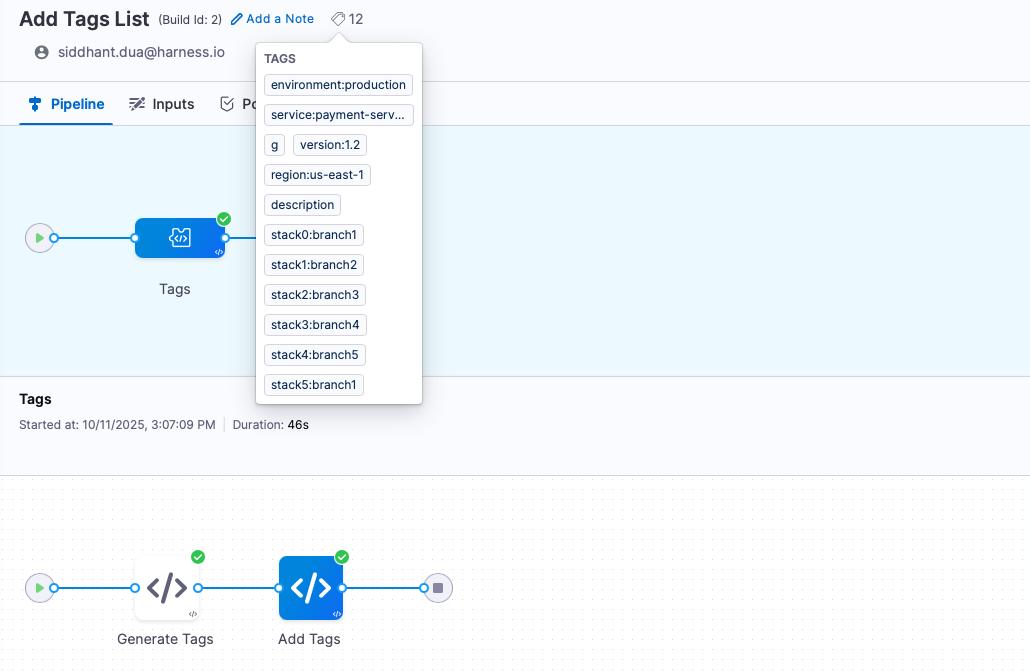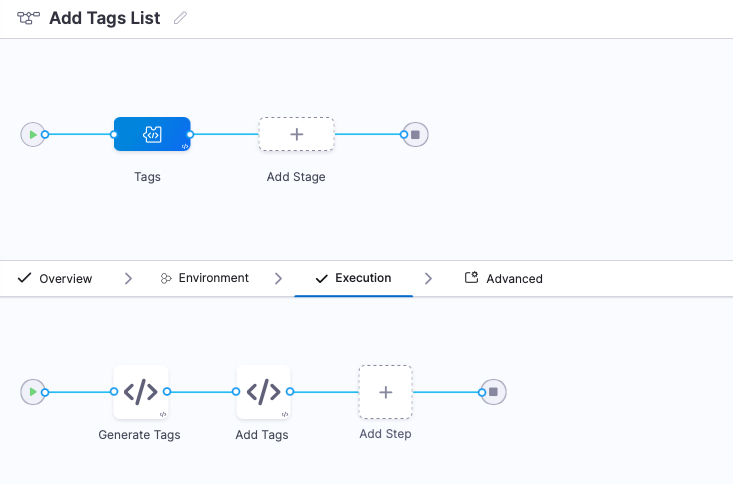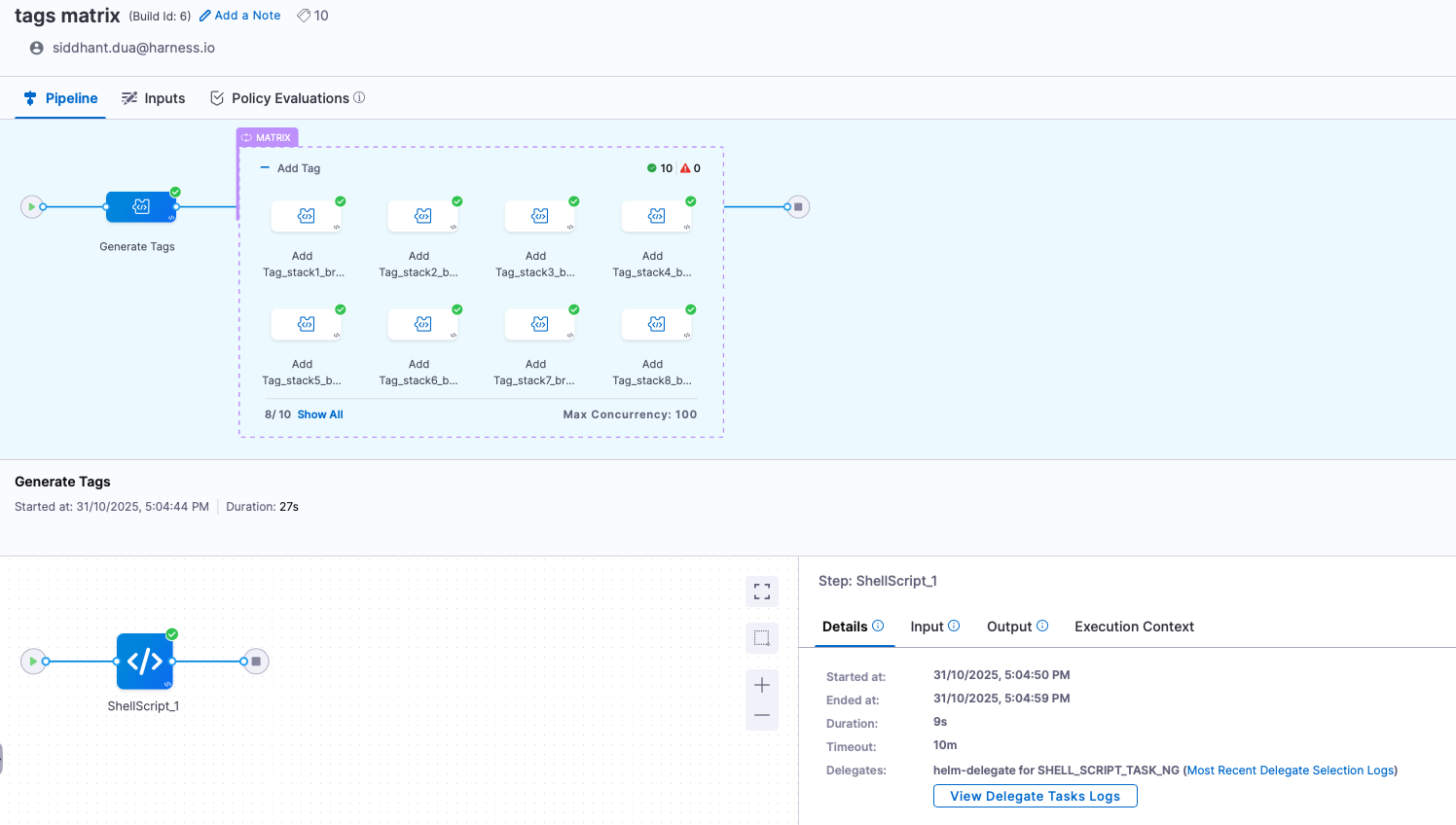Add tags dynamically to an execution
Overview
Harness supports dynamic tagging of pipeline executions, enabling you to attach contextual metadata as tags during runtime. These tags become part of the execution record and can be used with Harness’s standard tag-based search and filters to quickly locate specific runs.
In real delivery workflows, critical information such as artifact versions, environment details, matrix dimensions, or dynamically generated configuration values often emerges only at runtime, not when the pipeline is authored. Dynamic tags allow you to capture this real-time context directly on the execution, giving you a richer, more accurate history of what was deployed, where, and under what conditions. This makes debugging, auditing, compliance checks, and operational insights significantly easier and more reliable.

Expressions to add tags dynamically
The following expressions enable Harness to add tags dynamically to an execution:
| Expression | Description |
|---|---|
<+addTag(name, value)> | attaches a single key-value tag to the execution at the moment the expression is evaluated. |
<+addTagsList(listOfPairs)> | attaches a list of tags to the execution at the moment the expression is evaluated. |
Tags are not added to the pipeline definition. It exists only on the specific execution.
Limitations Inside Shell Script Steps
These expressions cannot be invoked within a loop inside a Shell Script step. This is because all expressions are evaluated before the Shell Script step begins execution. Therefore, a loop in a script cannot call addTag multiple times and you cannot generate tag values inside the same script and immediately attach them.
If your workflow requires generating multiple tags in a script, use the following pattern instead:
- Generate a list of tags inside a script and export it as an output variable.

Sample yaml for Generate Tags Shell Script Step
- step:
type: ShellScript
name: Generate Tags
identifier: ShellScript_3
spec:
shell: Bash
executionTarget: {}
source:
type: Inline
spec:
script: |-
#!/bin/bash
# Define tag keys and values (use empty string "" for blank values)
keys=("environment" "service" "g" "version" "region" "description")
values=("production" "payment-service" "" <+stage.variables.version> "us-east-1" "")
# Generate tags JSON
TAGS_JSON="["
for i in "${!keys[@]}"; do
if [ $i -gt 0 ]; then
TAGS_JSON+=","
fi
TAGS_JSON+="{\"key\":\"${keys[$i]}\",\"value\":\"${values[$i]}\"}"
done
TAGS_JSON+="]"
export EXECUTION_TAGS_LIST="$TAGS_JSON"
echo "Generated tags: $EXECUTION_TAGS_LIST"
json_output="["
# Generate 100 stack-branch combinations
for i in $(seq 0 900); do
if [ $i -gt 0 ]; then
json_output+=","
fi
stack="stack$i"
# Random-looking branch name using modulo logic
branch="branch$((i % 5 + 1))" # branch1 to branch5
json_output+="{\"key\":\"$stack\",\"value\":\"$branch\"}"
done
# TAGS_JSON+=""
json_output+="]"
# Export for use in pipeline
export EXECUTION_TAGS_LONG_LIST="$json_output"
echo "Generated tags: $EXECUTION_TAGS_LONG_LIST"
environmentVariables: []
outputVariables:
- name: EXECUTION_TAGS_LIST
type: String
value: EXECUTION_TAGS_LIST
- name: EXECUTION_TAGS_LONG_LIST
type: String
value: EXECUTION_TAGS_LONG_LIST
timeout: 10m
- Use
<+addTagsList(listOfPairs)>in the next step to attach them.
Sample yaml for Add Tags List Shell Script Step
- step:
type: ShellScript
name: Add Tags
identifier: ShellScript_2
spec:
shell: Bash
executionTarget: {}
source:
type: Inline
spec:
script: |
echo <+executionTags.addTagsList(<+pipeline.stages.shell.spec.execution.steps.ShellScript_3.output.outputVariables.EXECUTION_TAGS_LIST>)>
echo <+executionTags.addTagsList(<+pipeline.stages.shell.spec.execution.steps.ShellScript_3.output.outputVariables.EXECUTION_TAGS_LONG_LIST>)>
environmentVariables: []
outputVariables: []
timeout: 10m
Adding tags dynamically with Matrix Looping Strategy
You can use the expression <+addTag(name, value)> with matrix looping strategy to add tags iteratively to an execution.

The step to add tags dynamically with matrix looping strategy will look like this:

Please refer to the sample pipeline yaml provided below for more insights on how to add tags dynamically with matrix looping strategy:
Sample Pipeline Yaml for Generating Tags and Adding Tags dynamically with Matrix Looping Strategy
pipeline:
name: tags matrix
identifier: tags_matrix
tags: {}
projectIdentifier: siddhant_playground
orgIdentifier: default
stages:
- stage:
name: Generate Tags
identifier: shell
description: ""
type: Custom
spec:
execution:
steps:
- step:
type: ShellScript
name: ShellScript_1
identifier: ShellScript_1
spec:
shell: Bash
executionTarget: {}
source:
type: Inline
spec:
script: |-
export out="out"
json_output="{\"service\":["
# Generate 100 stack-branch combinations
for i in $(seq 1 10); do
stack="stack$i"
# Random-looking branch name using modulo logic
branch="branch$((i % 5 + 1))" # branch1 to branch5
json_output+="{\"stack\":\"$stack\",\"branch\":\"$branch\"},"
done
# Remove the trailing comma and close the array
export json_output="${json_output%,}]}"
# Export as a string variable
echo "Exporting service output..."
echo "service=$json_output"
export service="$json_output"
environmentVariables: []
outputVariables:
- name: out
type: String
value: out
- name: service
type: String
value: service
- name: json_output
type: String
value: json_output
timeout: 10m
tags: {}
- stage:
name: Add Tag
identifier: poll
description: ""
type: Custom
spec:
execution:
steps:
- step:
type: ShellScript
name: ShellScript_1
identifier: ShellScript_1
spec:
shell: Bash
executionTarget: {}
source:
type: Inline
spec:
script: |
echo "stack is <+matrix.service.stack>"
echo "branch is <+matrix.service.branch>"
echo <+executionTags.addTag(<+matrix.service.stack>,<+matrix.service.branch>)>
environmentVariables: []
outputVariables: []
timeout: 10m
tags: {}
strategy:
matrix:
nodeName: <+matrix.service.stack>_<+matrix.service.branch>
service: <+json.list("service", <+pipeline.stages.shell.spec.execution.steps.ShellScript_1.output.outputVariables.json_output>)>
maxConcurrency: 100
when:
pipelineStatus: All
More on Tags
You can find more on structure of tags and how to assign metadata using them in Harness here.